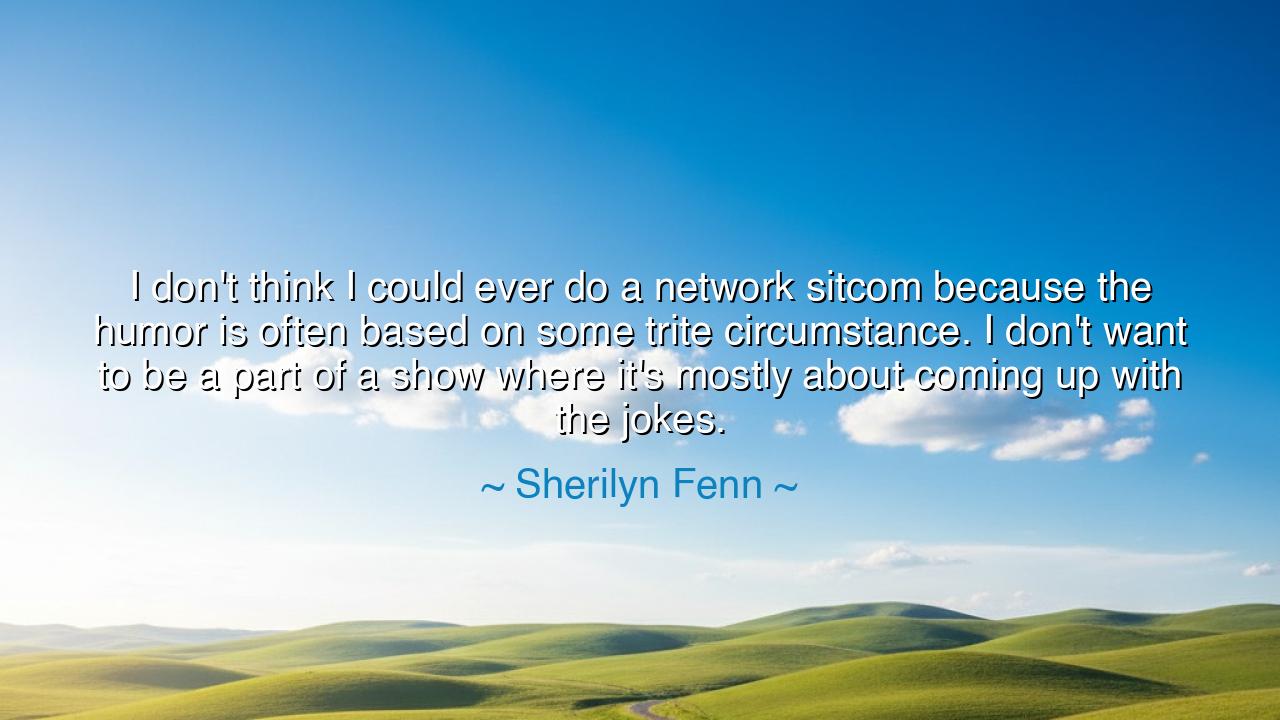
I don't think I could ever do a network sitcom because the humor
I don't think I could ever do a network sitcom because the humor is often based on some trite circumstance. I don't want to be a part of a show where it's mostly about coming up with the jokes.






The words of Sherilyn Fenn—“I don't think I could ever do a network sitcom because the humor is often based on some trite circumstance. I don't want to be a part of a show where it's mostly about coming up with the jokes”—carry the quiet thunder of an artist who has glimpsed truth beyond the noise. In this declaration, she rejects the hollow laughter born from habit, from formula, from the easy comfort of what is expected. Her spirit yearns not for applause, but for authentic expression, for that sacred spark where story and soul meet. To her, art is not a machine that produces laughter on cue, but a living fire—wild, unpredictable, and real.
In ancient days, the poets of Greece and the dramatists of Rome knew this same burden. Aeschylus, when writing his tragedies, was told by many that his plays were too somber, too strange for the public. Yet he answered not with compromise, but with faith in his vision. “I write,” he might have said, “not for the crowd’s momentary pleasure, but for the conscience of mankind.” Like Sherilyn Fenn, he knew that truth in art must not be sacrificed to cheap entertainment. The gods of comedy and tragedy both demand sincerity; when art becomes a tool for applause rather than revelation, it loses its divine breath.
There is in Fenn’s words a mourning—for what creativity becomes when it is forced into the mold of commerce. The network sitcom, she says, often thrives on trite circumstance—the predictable misunderstanding, the recycled joke, the shallow resolution. These are not born from the heart, but from the machinery of repetition. She speaks as a guardian of depth, refusing to let her spirit be bound by the chains of mediocrity. For her, humor without truth is like a feast without nourishment; it fills, but it does not sustain.
Consider the story of Charlie Chaplin, the silent clown who could make the world laugh and weep in the same breath. His art was not about “coming up with the jokes,” but about revealing the human soul beneath the laughter. When the Little Tramp stumbled, he mirrored the fragility of every man. When he smiled, he carried the sorrow of an age within that smile. His genius lay not in the trick or the gag, but in the truth he hid beneath the humor. This is the lineage Fenn belongs to—the artist who sees beyond the stage, who hears the pulse of humanity in every line.
There is also defiance in her words, a heroic refusal to bend before the marketplace of art. She chooses the lonely road of the sincere creator, rather than the crowded path of approval. This is the same courage that moved Van Gogh, who painted in the face of ridicule, who died poor and uncelebrated, yet whose colors still burn across the centuries. True art, like true life, is rarely safe. It is a rebellion against comfort and imitation. Fenn’s declaration is the modern echo of that eternal truth.
And yet, this quote is not only for artists. It speaks to all who labor in a world that tempts them to settle for the easy and the shallow. Whether one writes, teaches, builds, or loves, there is always the choice between authenticity and convenience. The call of the quote is to reject the trite circumstance—to rise above habit and expectation, to create with meaning rather than mimicry. To live, not by formula, but by purpose.
Let this be the lesson carried forward: do not live your days merely “coming up with the jokes.” Do not seek laughter without depth, nor comfort without truth. Instead, seek the work that stirs your soul, even if it brings silence instead of applause. Speak words that matter. Create from the core of your being, even if the world does not understand. For only in that sacred act of integrity does your spirit become eternal.
So let her words echo as an oath: Choose meaning over mimicry. Choose truth over applause. Choose art over entertainment. The world may favor the easy laughter of the moment, but history belongs to those who dare to speak from the depths of the human heart.






AAdministratorAdministrator
Welcome, honored guests. Please leave a comment, we will respond soon